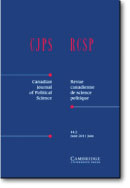Sharing the Burden of the Border: Layered Security Cooperation and the Canada-US Frontier

Author(s): Stéfanie von Hlatky, Jessica Trisko
Journal Title: Canadian Journal of Political Science
Reviewed:
Volume: 45
Issue: 1
Pages: 63-88
Publisher(s): Cambridge University Press
Publication Year: 2012
